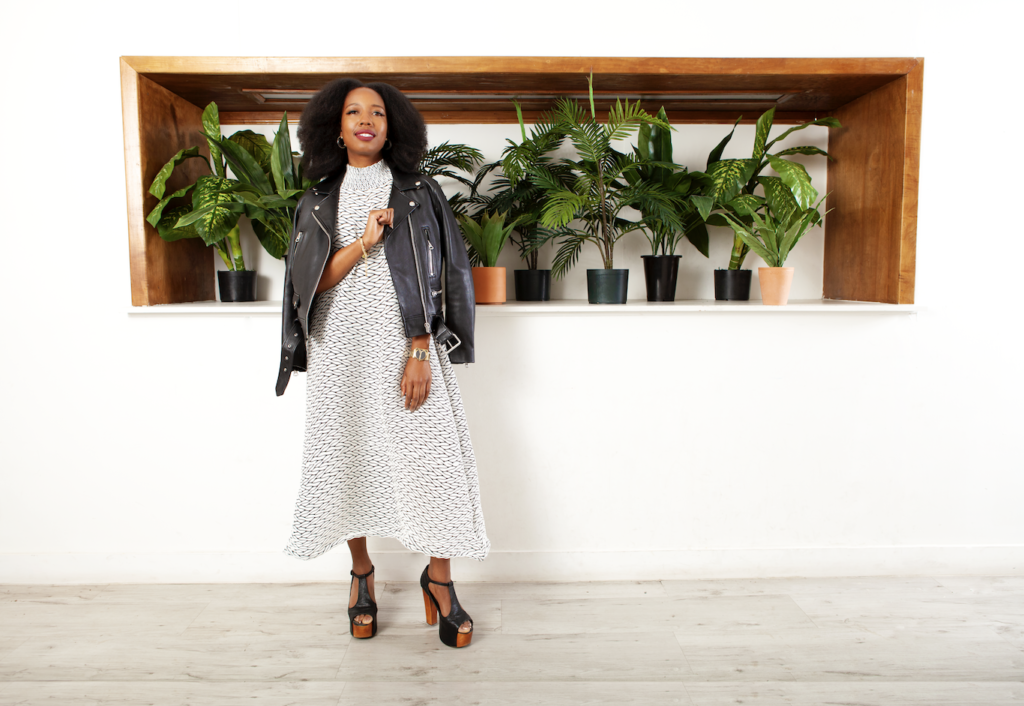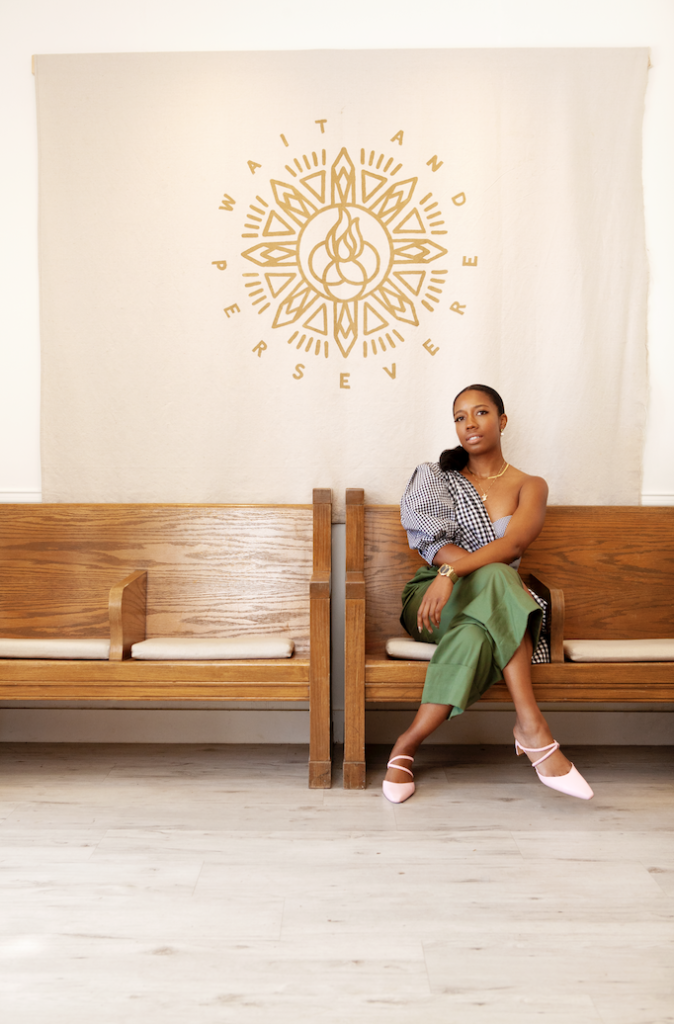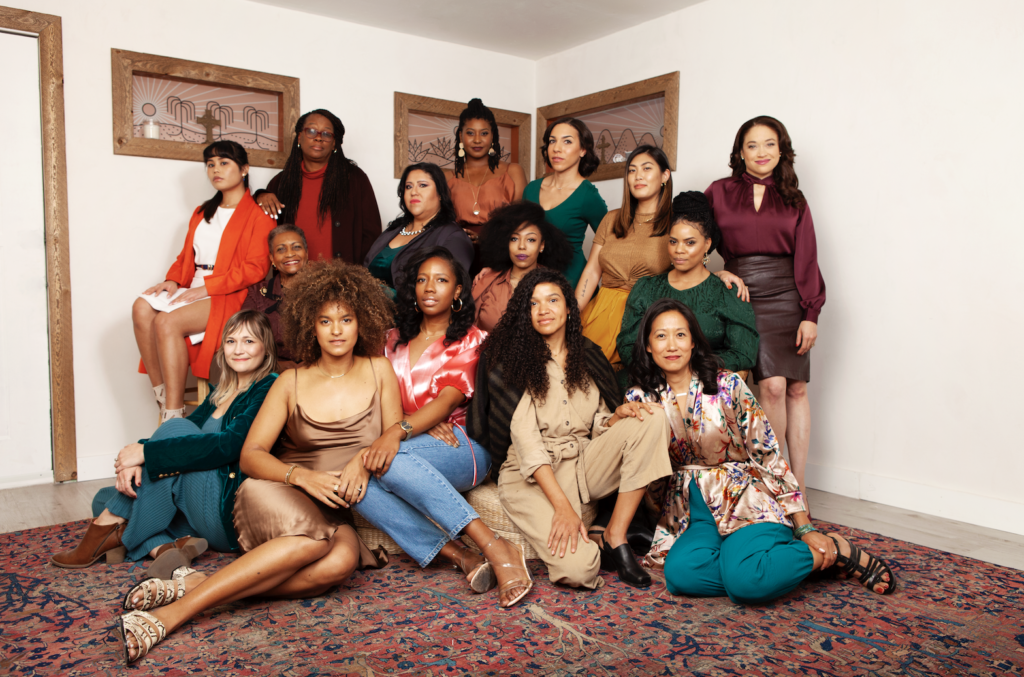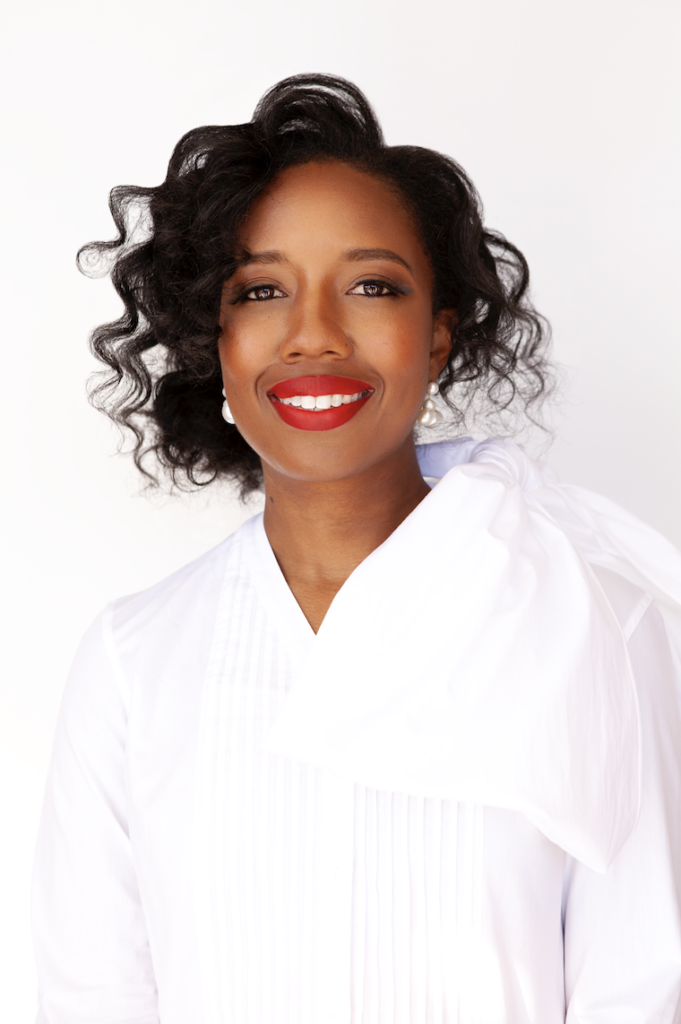Virginia Cumberbatch discusses social justice, Austin’s growing divide and how she’s advocating for equity one neighbor at a time.
By Jenny Hoff, Photos by Rudy Arocha, Hair by Tiffany Nicole, Makeup by Nia Ford, Styled by Graham Cumberbatch, Shot on location at Vesper
Virginia Cumberbatch is on a mission to teach Austinites the art of good neighboring. And she practices what she preaches. Perched on
a chair outside her cozy, stylishly decorated East Austin bungalow is a chalkboard sign that reads, “Welcome, y’all!” It’s both a greeting and a reassurance to longtime residents of this historically lower-income neighborhood that she’s not here to displace them but to connect with them in a way neighbors should. The first step: walking down the sidewalk and knocking on a door.
“Part of the reason I moved here is that I didn’t want to let this entire neighborhood be taken over by people who don’t look like me,” Cumberbatch says as she pours a cup of tea for both herself and her guest, ensuring a sense of welcoming and warmth in her home. “I wanted to live on a street where I could literally walk over and know my neighbor. Two doors down from me is Ms. Baker, who is 92 years old, and two doors that way is Mr. Johnson, who worked at the first integrated restaurant. That was important to me to be in a community surrounded by my elders and be in a community that reflected diversity.”
It’s a diversity Cumberbatch didn’t experience growing up in the Allandale neighborhood in West Austin and attending private schools with her brothers and sister, often as the only African American children in the class. That may be partly due to Austin’s history of segregating neighborhoods, starting in the 1870s, when “Freedmen Towns” were displaced in order to build MoPac Expressway, and culminating in 1928 with a City of Austin Master Plan creating a segregated “Negro District,” compelling most of the city’s black residents to move to East Austin.
“The deed on our house still said negros couldn’t live in our neighborhood,” Cumberbatch says.
When she moved back to Austin after finishing an undergraduate degree in history and sociology with a focus on race and social constructs in the Americas at Williams College in Massachusetts, Cumberbatch made it her mission to make more friends of color.
“I was trying to find my place in a city that I had always called home, but it was a city that I realized in my adulthood wasn’t really built for me,” Cumberbatch says. “I just happened to be born into a family with the resources to navigate the system.”
Before she knew it, she was spearheading an Urban League Young Professionals chapter that had died out years before.
“I sent out emails to every black person I knew at the time and said, basically, ‘Not only are we not connected, but there is no pipeline for us to enter leadership,’ ” she recalls. “We had a conference room that was supposed to fit 20 people and, instead, 60 people showed up. All of it was out of self-preservation.”
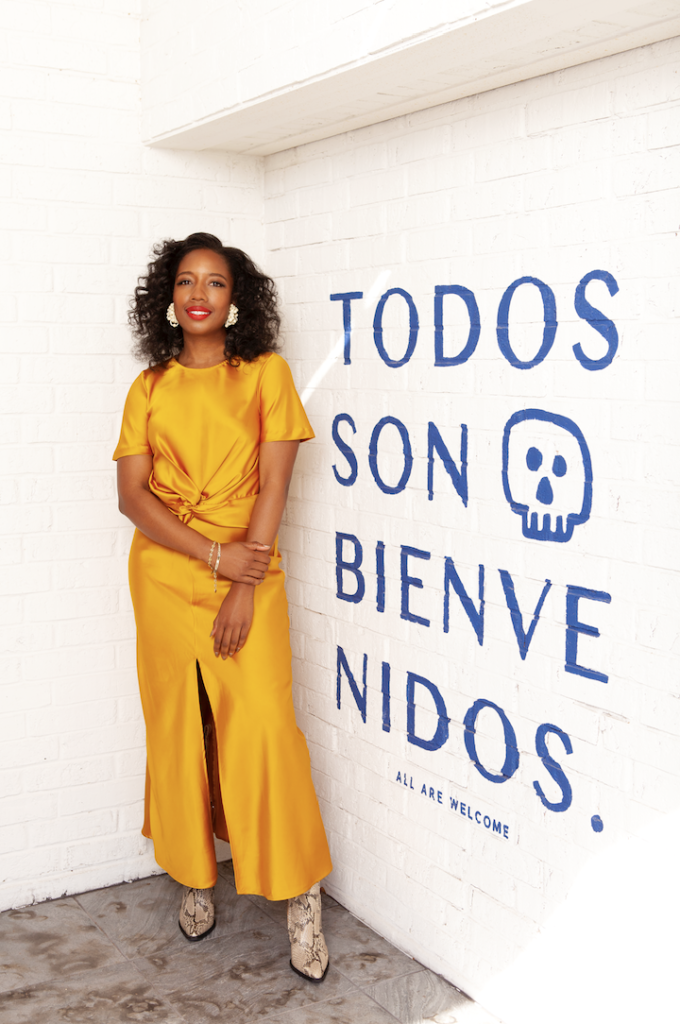
Self-preservation is a skill Cumberbatch acquired early in life and it’s one that’s helped her persevere and even thrive in the wake of obstacles and heartbreak, like when she was cut from her collegiate soccer team due to a previous injury.
“When she’s disappointed in something, she doesn’t stay down. She shifts the energy from a door that’s closed to one that is open,” says her brother Graham Cumberbatch. “She channeled that energy and focus into, I believe, training to become a community leader.”
With soccer off the table, Virginia Cumberbatch took to writing and fell in love with storytelling as a means to both inspire and influence people, as well as effect change. She founded a faith-centric magazine in college and honed her oratory skills. When she graduated, she returned to her hometown to work with Hahn Public Communications, where she says she got an intimate look at how Austin operates through the major companies and nonprofits she worked with.
Between her work, the Urban League and the various nonprofit boards she sat on, Virginia Cumberbatch was a firsthand witness to her native city’s boomtown success, but she says she’s also witnessed a divide that’s only growing.
“I think Austin is in the midst of its reckoning,” she says. “It’s the most economically segregated city in the country.”
According to a study conducted by the Institute for Urban Policy Research and Analysis at the University of Texas, longtime East Austin residents, mostly black and Latino, are moving in droves outside the city and into neighboring towns like Round Rock, Texas, mainly due to skyrocketing housing prices and overall affordability issues, along with a desire for better schools and a sense of no longer being welcome in a part of town they’ve called home for generations.
Virginia Cumberbatch is ready to welcome them back. One way to do that, she believes, is for local media and community leaders to do more to recognize Austinites of color who are serving the community. As a member of the Mayor’s Task Force on Institutional Racism and Systemic Inequities; recipient of the 2016 Anti-Defamation League of Austin Social Justice Award and the 2018 Austin Under 40 Award for Government, Policy and Civic Engagement; chair of the Waterloo Greenway Community Engagement Committee and a founding board member of Six Square: Austin’s Black Cultural District, Virginia Cumberbatch feels she has become a go-to interview for Austin media, a position she would prefer to hand off to other people of color who have been fighting for social justice in Austin for decades.
“When I was leading the Urban League of Young Professionals, we would get last-minute emails requesting someone in our community to be part of a top 10 list or an award nomination,” she says. “It always felt like we were an afterthought. It hasn’t changed.”
Virginia Cumberbatch says her work isn’t about gaining notoriety or moving up in her career. She believes fighting for equity is a calling from God.
“I lean on seeking wisdom from God in the moments where I could be easily pushed into the direction of something that just feels good,” she says. “My faith is the centerpiece. My job might change, my passions might change, my resources might change, but that’s pivoting around my purpose and calling.”
And she is also calling on church leaders to join the cause. As a member of a prominent Austin family and the daughter of two pastors (her father is also a well-known lawyer), Virginia Cumberbatch chose her church with as much serious forethought as she chose her home, wanting to make sure it was operating by the principles she believes Christianity demands.
“The church should be ground zero on the work with equity and justice,” she says.
The church she chose, Vox Veniae, acts as a community center Saturdays and a house of worship each Sunday.
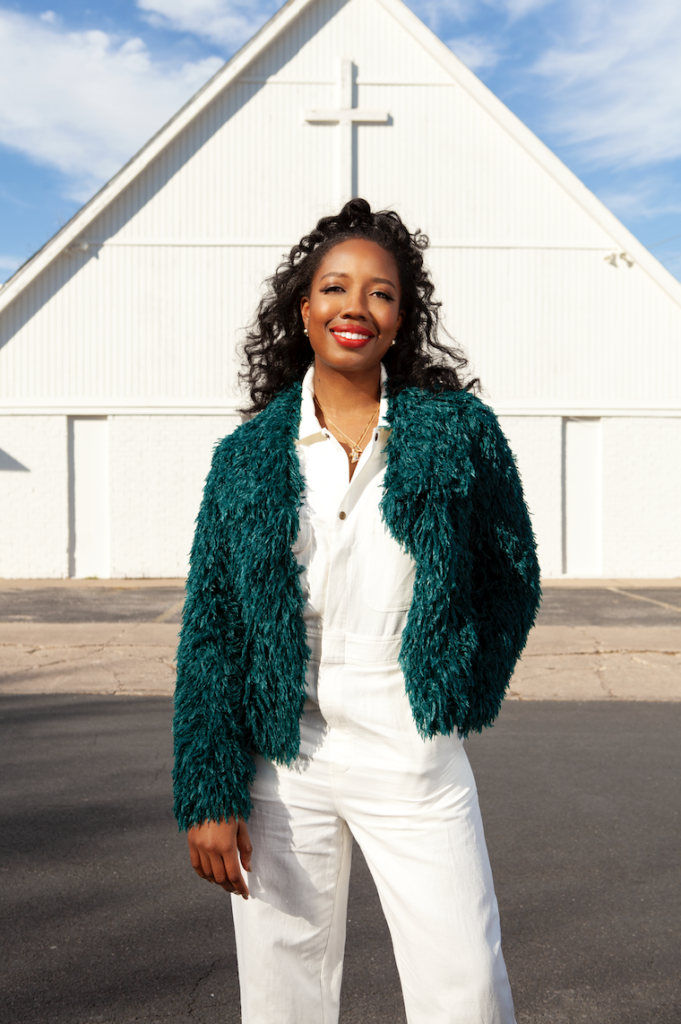
Faith, community activism and giving back are all legacies Virginia Cumberbatch says she inherited from her family. Her grandparents were also pastors and community leaders on the West and East coasts, where her parents are originally from, and it’s a lesson her parents instilled in her from birth.
“There is a scripture that says, ‘To he who much is given, the same is expected,’ ” says Pastor Jennifer Cumberbatch, Virginia Cumberbatch’s mother. “Our family has been blessed with education, with platforms and a faith that has been fixed on God’s provision for vision. I think it’s just out of gratitude that we give back.”
Virginia Cumberbatch feels she can give back the most through telling stories of people she believes have been marginalized. After leaving the public-relations world, she opted to stay in Austin and obtain a master’s degree in public affairs from the University of Texas’ LBJ School of Public Affairs. While studying and working on staff, she co-authored the book As We Saw It: The Story of Integration at The University of Texas at Austin, which recounts the experiences of the first black students admitted to UT between the 1950s and 1970s.
Leslie Blair, executive director of communications for UT’s Division of Diversity and Community Engagement, and co-author of the book, says it was a project that was a long time in the making and one Virginia Cumberbatch was meant to complete.
“She is someone who can blend her faith, her values and her vision into her everyday life, and she does it without being judgmental of other people,” Blair says. “Even though there is a 30-year difference between Virginia and I, she really is just a role model in so many ways.”
After completing her master’s degree, Virginia Cumberbatch took the role of director of equity and community advocacy for UT’s Division of Diversity and Community Engagement. In her role, she interviews, tells the stories of and engages with community members from diverse backgrounds and builds a relationship between them and the university. UT gets vital information that helps with research through the lived experiences of Austinites and works on issues such as affordable housing and access to resources.
Virginia Cumberbatch says it took time to build trust with a community that is wary of the 40 Acres.
“I had two things against me: I felt that as part of the University of Texas, people didn’t trust me at first. And the second one was I was 27 years old when I started,” she says. “I was young for a director doing that work, going into spaces with people who had been doing this work as long as I had been alive.”
One step in building trust was getting off campus and creating an office in East Austin, one that would feel more welcoming to the people the organization is trying to reach. It’s a little more neighborly, you could say.
“We envisioned this unit as the ‘front porch’ of our university, inviting folks into what is often a huge, intimidating and previously unwelcoming campus home,’’ says Suchitra Gururaj, assistant vice president for community engagement and economic development, and Virginia Cumberbatch’s boss. “The goal for the unit was to create time and space in the community for collaborative work with the people of UT toward pursuing solutions to complex community issues.”
The division will soon move to a new building off Navasota Street built by John S. Chase, the first black student to graduate from UT’s School of Architecture and the first licensed black architect in Texas.
Virginia Cumberbatch recognizes that being part of a major institution, especially one with a checkered past when it comes to race relations, is in some way at odds with her activist nature. Instead of fighting to tear down a system, she is trying to change it from within. But she hasn’t given up on activism. In 2018, she co-founded the nonprofit Rosa Rebellion, along with civil-rights lawyer Meagan Harding, as a resource for women of color to change the current system through creative output: writing, media and film.
“Storytelling is a form of disruption,” Virginia Cumberbatch says. “I think elevating people’s stories is a form of protest.”
In 2019, the duo launched Rebel + Rest, a full-day event at South By Southwest during which they worked with activists on handling mental-health issues that could arise from their work. What amazed Virginia Cumberbatch was the outpouring of support she received from the community, from people donating their houses for speakers to stay to giving R+R a day at a festival that has thousands of organizations competing for time and space.
“Meagan and I joke that one of the most surprising and joyous things to come from Rosa Rebellion is the rise of the woke white woman,” she says with a laugh. “It’s fellow agitators saying, ‘I have a platform. Use it. I’m not going to let the burden rest on you.’ ”
For Virginia Cumberbatch, it was a welcome revelation to find other Austinites believing in the importance of being a good neighbor.
“Neighboring takes listening, empathy, understanding and love,” she wrote in a recent article for propelwomen.org. “There are people in our community who have been disenfranchised, brutalized and marginalized who could use a neighbor to speak up for them, support them, love them. … So, the question I pose to us now…: What part will you play in the art of neighboring?”
AUSTIN WOMEN WHO INSPIRE VIRGINIA CUMBERBATCH
Top row standing, left to right: Yvonne Adams (director of equity and inclusion at St. Stephen’s Episcopal School), Denisha Jenkins (founder and CEO of Kardia Advisory Group), Savannah L. Barker (director of strategic programs at Notley Ventures), Terri Broussard Williams (founder of Movement Maker Tribe)
Top row sitting, left to right: Regine Malibiran (co-founder of Collective Blue and Missfits Productions), Paulina Artieda (executive director at The New Philanthropists), Kristina Gonzalez Sander (founder of In Bold Company and co-founder of Missfits Productions)
Middle row sitting, left to right: LaVonne Mason (CEO of Etiquette Authority), Yasmine Smith (managing partner at Smith & Mendoza; vice president at People United for Mobility Action; and commissioner for board of adjustment at Austin Area Urban League), Meme Styles (founder of Measure)
Bottom row sitting, left to right: Chloe Quakenbush (awards and grants programmer for South By Southwest), Riley Blanks (owner and photographer at Woke Beauty), Virginia Cumberbatch, Shaleiah Fox (founder and board president of Fresh Chefs Society), Emlyn Lee (founder of BRAVE Communities)
VIRGINIA CUMBERBATCH: EQUITY RISING
Austin Woman: Many companies have made significant strides to diversify their workforce. What do you think still needs to be done?
Virginia Cumberbatch: In my assessment of how I’ve seen it function, I think we’ve stopped at the diversity and inclusion piece but we haven’t addressed equity. The system itself is developed in a way that meets the needs in all of that diversity. Diversity and inclusion can be set by the entity in power. America, as it functions, the norm is set at the experience of whiteness. Diversity is just who is in the room. Inclusion is actually asking everyone in the room to participate at the table. Equity is when everyone gets a chance to build the table.
AW: What would equity look like to you in Austin?
VC: I think housing is one of the clearest barometers of equity. How people are living and where they are living is a clear indication of who is valued in the city. Before, the East was not valued, but the West was valued. In the latter part of the decade, we’ve said, “Your value is based on your visibility.” If we keep moving in the direction we’re moving into now, the only people visible will be wealthy and mostly white. Equitable housing would be moving in the right direction.
AW: What’s a good place to start?
VC: What I would like to see shift would be Austin’s acknowledgement of past pain and trauma as a city—it’s not even well-documented—to know the people who built that community out of nothing when they were forced to move here. [We need] more transparency about the history of our city and acknowledging our pain. It amazes me in America how we are so quick to talk about what another country has done wrong but we won’t even say the word “slavery.”
AW: What do you think Austin media needs to do to better reflect the whole Austin community?
VC: Media is supposed to reflect and interrogate the space it represents, particularly in a city that considers itself liberal and progressive, but we know that is not the lived experience of everyone in this city. In five years, I want the image of Austin to no longer read as the white millennial but reflect the multifaceted beauty, boldness and brilliance of people of color and women of color because we are Austin. We are Austin women and we should be seen, recognized and celebrated as such.
ON LOCATION
Vesper means an evening prayer or rest. In the rush of today’s culture, Vesper aims to create a space where people slow down, chat with friends and neighbors, and create out of who they truly are. Vesper shares a partnership with Inside Books Project and Brown State of Mind and welcomes both private and community events. Income generated from private-event rentals supports Vesper’s capacity to provide affordable space to groups that offer free programming to the community. This means renting at Vesper provides both an elegant space to the renter and for future local community events. vesperaustin.com
Acne Studios jacket, $1,550; Vada Jewelry bracelet, available at By George, 1400 S. Congress Ave., bygeorgeaustin.com; Issey Miyake dress, $1,610, available at Kick Pleat, 624 N. Lamar Blvd., kickpleat.com.
Acler gingham top, $360, available at Altatudes, 1717 E. 12th St., altatudes.com; Tibi pants, $375, Rosetta Getty shoes, $690, available at Kick Pleat, 624 N. Lamar Blvd, kickpleat.com; jewelry by Vada Jewelry, available at By George, 1400 S. Congress Ave., bygeorgeaustin.com.
Amanda Uprichard top, $172, available at Estilo, 2727 Exposition Blvd., estiloboutique.com; vintage Levi jeans, $98, available at Passport Vintage, 2217 S. First St., passportvintage.com; initial necklace by Vada Jewelry, available at By George, 1400 S. Congress Ave., bygeorgeaustin.com.
Dra top, $133; Dra skirt, $147; Alias Mae boots, $280, available at Estilo, 2727 Exposition Blvd., estiloboutique.com; Vada Jewelry bracelets, available at By George, 1400 S. Congress Ave., bygeorgeaustin.com.



